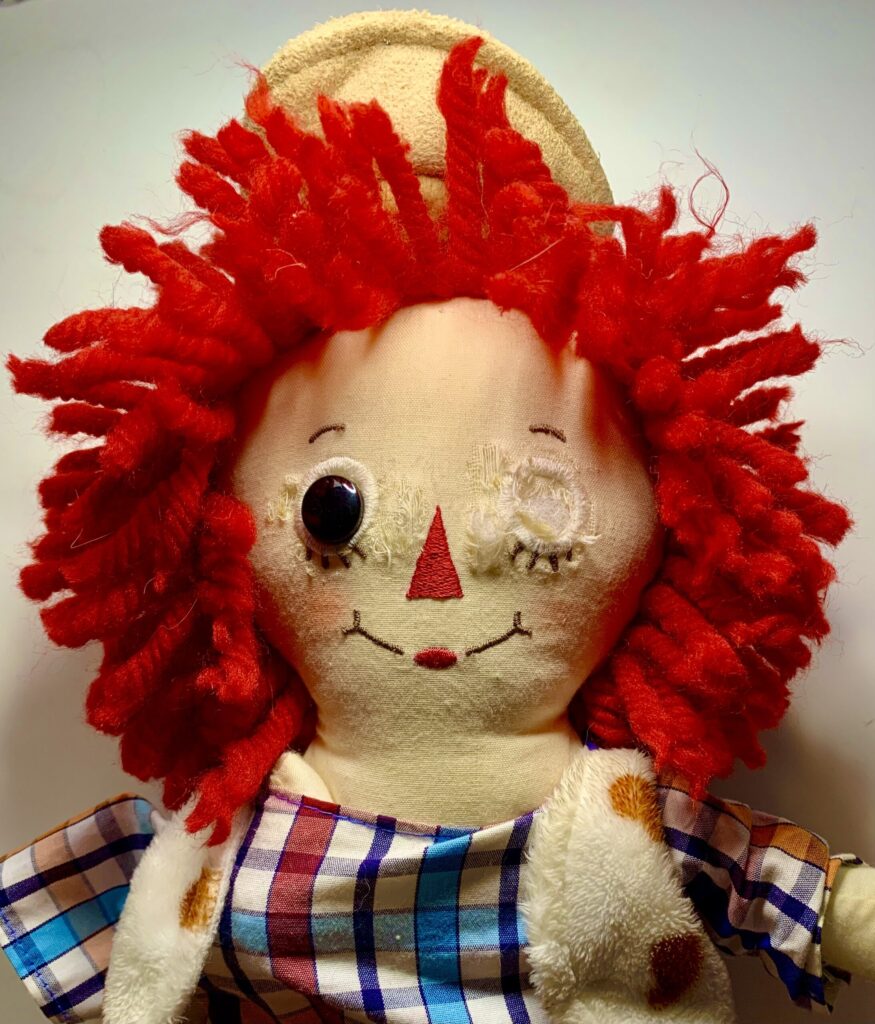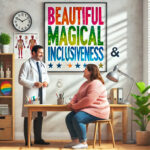Here’s to being imperfectly perfect and perfectly imperfect

Here’s to being imperfectly perfect and perfectly imperfect
‘Perfectionism’ is a common trait among people who develop an eating disorder. Karyn and Tanya explore the impact of perfectionism and why imperfection is important to them today.
Karyn – to banish imperfection is to destroy expression
I was a normal child wanting to be accepted and loved. Acceptance and love were not there from those who brought me into the world. I missed out on nurturing. I only became aware of the difference when around others who had it. I wondered what was so bad about me that l could never please my parents.
So, l tried harder, and harder, and harder. No matter how hard l tried l was never up to the standard they expected. I was a disappointment. I became chronically disappointed in everything l did or said. The punishment never seemed to fit the crime, but what could I do to change it?
‘Maybe if am a good Christian, I will be more lovable, because l will be a good person.’
This had to be the answer. So, l got baptised in the church and was washed clean of all my sins.
‘Now l will be perfect, now l will be loved, now l can have a fresh start.’
That night l was stripped of my cleanliness. I never felt so low when those words, which were so cruel, came out of my father’s mouth.
“Who do you think you are?” he said. “Get that ribbon out of your hair and get into bed.”
‘I will never be a perfect anybody.’
Without waiting, he ripped the white ribbon from my hair and with it all the goodness l had hoped l now had. His action meant I would never be a perfect Christian.
Like many times before, my heart was ripped out. ‘I will never be a perfect anybody.’ I was destroyed to the point where my smile was not good enough, my voice was not good enough, my hygiene was not good enough. The sick need for me to be perfect destroyed all expression, for many, many, years to come.
I was pushed to the limit in everything l tried to do.
I was not smart, but l could have been.
I was not talented, but l could have been.
I was not sociable, but l could have been.
I was not free to be myself, but with love and acceptance, understanding and encouragement who knows what I could have been.
The mental energy consumed in trying to be perfect, when everything and everyone were against me, was damaging. Everything was hard. I was set up for failure before l had a chance to start. My vitality was paralysed.
Everyone’s “perfect” is different…I had to look within myself to find the answers
I had no chance to live, grow, and develop as the person l was meant to be. In my 60s now, I have suffered all my life trying to be good enough, wishing l was someone else, as a wife, a mother, a friend, a daughter, a sister, an aunty, a cousin, a niece…a member of whatever l have tried to join.
I was stunted in developing the inner me. I had to learn through not wanting to live how to find a life worth living…and choose to wander slowly along this pathway. This was the hard way but the only way to be “me”. I discovered l would never be perfect in the way that perfect meant to me. Everyone’s “perfect” is different…so I had to decide to look inside myself and find the answers within.
“Imperfectly perfect,” is my mantra. This gives me goals and gives me hope. I always want to be able to hope that, “It’s never too late.”
I allow for imperfection while never giving up on the perfect l have chosen. Because it is mine.
Tanya – why striving for perfection is pointless
Striving for perfection is pointless because we are human. We are not infallible, we are not flawless. We were never designed to operate perfectly. We are not machines – and even machines make mistakes. A machine or electronic device may operate perfectly; at least for a while. Yet, over time it will begin to wear out and require repair. We become disconnected if we think ourselves above human. Many traits of appearance and personality are part of our genetic make-up, such as hair, body shape, teeth, skin. In my teenage years I desperately strove to have luscious, thick hair like my brother and sister. Of course, I took many years to realise, no, I am not perfect, I have thin, straggly hair, and need to deal with it accordingly.
Reaching for perfectionism is an unreliable basis for deep happiness. Life is not perfect! Things happen; life happens. You only put yourself at risk of failure, disappointment and regret, if you strive for perfectionism. For example, on my honeymoon in India, we planned the perfect day soon after arrival with a lunch at a five-star hotel. I found chicken burgers on the menu and excitedly ordered one. Six hours later I was suffering from severe food poisoning which wiped me out for the next five days.
Perfectionism leads to self-imposed guilt and unhappiness
My mother used to say, “If it’s meant to be, it’s up to me,” and throughout my upbringing I truly thought perfectionism was within my power. Unfortunately, this attitude led to self-imposed guilt and unhappiness as I criticised myself for perceived flaws and weaknesses.
This was especially so with my school studies. I was never satisfied with anything less than 100%, or an A+, and would spend hours and hours studying at home. In Year Seven I had the same English teacher as my brother who was in Year 10. Mr M once gave my brother 11 out of 10 for an essay and I wanted desperately to achieve the same score. It took a lot of 10 out of 10s before I finally got that score of 11 – and then 10 out of 10 no longer seemed the perfect mark for me and led to harsh self-criticism and dissatisfaction. I focused so much on my studies that I missed out on many things, particularly social interaction with peers. (My husband now affirms, “If it is meant to be, it will be” – a far more realistic statement).
In striving for perfection, we miss opportunities for self-growth
When we strive for perfection, we thwart opportunities for self-discovery, self-improvement and growth. Through our weaknesses comes strength. Through our struggles comes resilience. In my fifties, I know this now.
Instead of striving to be perfect, it is healthier, mentally, to embrace our imperfections. I try to practice self-acceptance instead of striving for perfectionism as I know from experience the latter leads only to feelings of unworthiness. This can be detrimental to our health. My tendency to have a negativity bias ignores what is good in me and focuses instead on all that is imperfect, flawed and negative. For example, I used to feel incredibly embarrassed about having an eating disorder – that it was my own fault, that I had a self-imposed weakness. But – after a lot of therapy – I am beginning to view my anorexia in a different light and I don’t beat myself up about it anymore. I accept that, at the moment, it is actually part of me and is the result of many factors, many of them being out of my control. I am not perfect and I feel much better accepting my eating disorder rather than self-blaming and trying to hide it away.
Embracing imperfections is being true to self
By embracing our imperfections we are being true to our authentic selves. One of the values by which I live is integrity and to this end I try to be honest, transparent and as truthful as possible – to both myself and to those around me. I try not to live my life according to the expectations and high standards of somebody else. For example, I realise now that I might have maintained my position at a respected school largely because I knew this pleased my Dad and made him proud. However, (once Dad had died) I eventually realised that I actually was unhappy there and part of this was because I was trying to be the perfect daughter to Dad, a distinctive flaw of mine.
Similarly, I follow the nanny forum for upcoming positions in my current work as a nanny. I notice that everybody else at the agency seems to work across all ages. I am more comfortable with aged three upwards. I want to be the perfect nanny and the perfect employee and to be as flexible as the other nannies. However, I know I would struggle with the very young children because of lifting them all the time so I am a little picky in my choices and endeavour not be be influenced by the high standards or capabilities of other nannies. I am not the perfect nanny employee. And that’s okay because, most importantly, I am taking care of me.
Admitting our struggles to ourselves and others is unifying
Another benefit of embracing imperfections is that by doing so we foster connection. Imperfections humanise us, they are relatable. As such, it is unifying to admit our struggles both to ourselves and to others. This sharing is important to combat feelings of isolation and potential depression. When I spent six intensive weeks in an eating disorder clinic with seven other girls with eating disorders, I felt comfortable and connected and formed bonds with several of them because we were all going through something similar and because none of us were perfect. In my pursuit of excellence at school, I missed out on connecting with my peers and teachers (even with my family to an extent) due to trying to be the perfect student all the time.
If we don’t embrace imperfectionism, we miss out on possibilities for growth and development. This is especially so when we reflect and dwell on the past. How can we move forward if we berate ourselves for being less than perfect? We become stronger, more rounded humans when we admit we can always learn something from our mistakes/flaws/imperfections. Calling ourselves to task for a perceived fault, trying to understand the cause, and resolving to correct or avoid repeating it (if within our control) is beneficial. Only then do we have the capacity to move on.






Thank you for your strength. I’m 42, sitting in a motel room, all my worldly belongings in a garbage bag and happened across your site while trying to figure out if I’m perfectly imperfect or imperfectly perfect. Either way it doesnt matter. I’m just me and alone in this room I’m unapologetic for it. I just wanted to say thanks to you because of your story I feel like mine might be worth a new paragraph. (Hell, maybe 2). Seriously though, thank you, Sadie